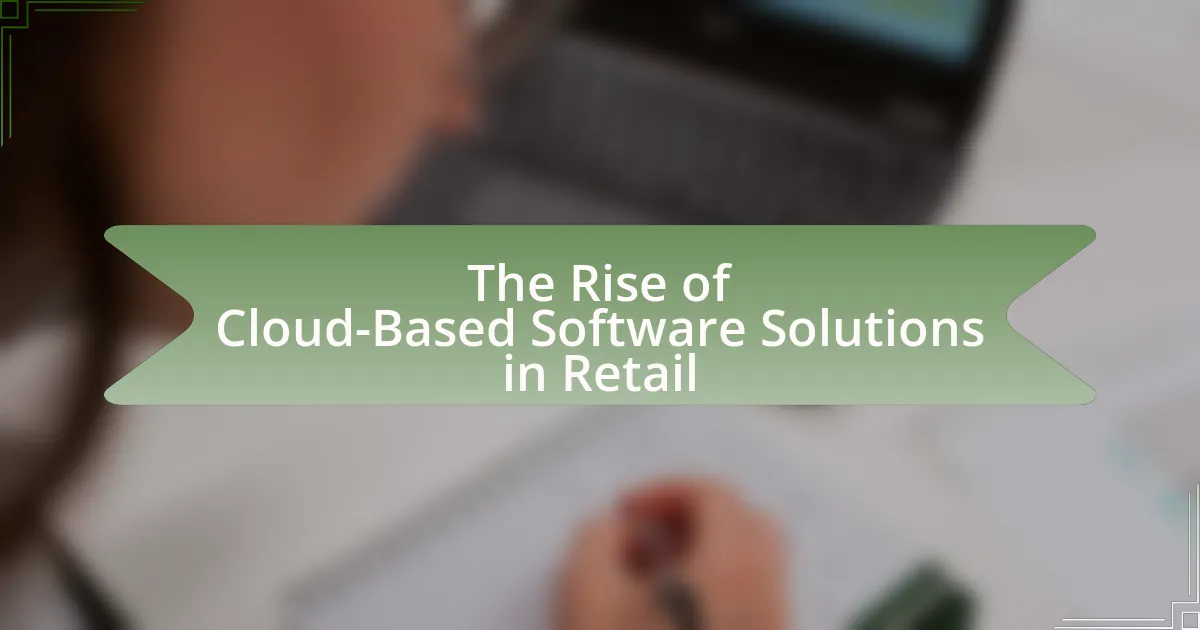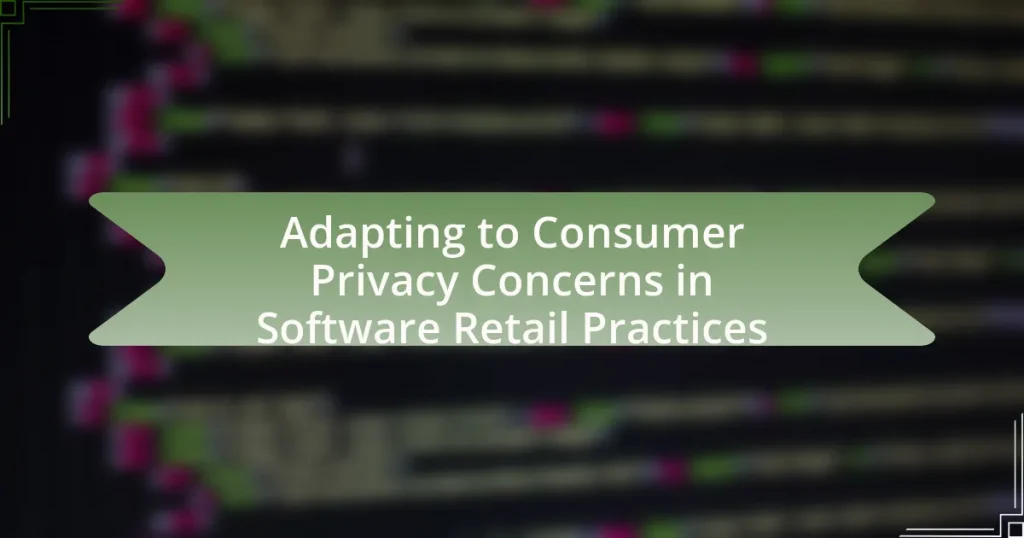Cloud-based software solutions in retail are digital applications hosted on remote servers that facilitate the management of operations, inventory, sales, and customer relationships via the internet. These solutions offer significant advantages such as scalability, flexibility, and cost-effectiveness, enabling retailers to access real-time data and analytics from any location. The article explores the differences between cloud-based and traditional software, key features, benefits, and the increasing adoption of cloud technologies in the retail sector, driven by consumer expectations and market trends. Additionally, it addresses challenges retailers face during implementation, including data security and integration complexities, while providing best practices for selecting providers and ensuring successful transitions.
What are Cloud-Based Software Solutions in Retail?
Cloud-based software solutions in retail are digital applications hosted on remote servers that enable retailers to manage operations, inventory, sales, and customer relationships over the internet. These solutions provide scalability, flexibility, and cost-effectiveness, allowing retailers to access real-time data and analytics from anywhere, which enhances decision-making and operational efficiency. According to a report by MarketsandMarkets, the global cloud computing market in retail is projected to grow from $10.9 billion in 2020 to $31.4 billion by 2025, highlighting the increasing adoption of these technologies in the retail sector.
How do Cloud-Based Software Solutions differ from traditional software?
Cloud-based software solutions differ from traditional software primarily in their delivery model and accessibility. Cloud-based solutions are hosted on remote servers and accessed via the internet, allowing users to access applications from any device with internet connectivity, whereas traditional software is installed locally on individual computers and requires specific hardware configurations. This difference in deployment leads to advantages such as automatic updates, scalability, and reduced upfront costs for cloud-based solutions, as users typically pay a subscription fee rather than a large one-time purchase. Additionally, cloud-based software often facilitates collaboration and data sharing in real-time, which is less efficient in traditional software environments.
What are the key features of Cloud-Based Software Solutions?
Cloud-based software solutions are characterized by their accessibility, scalability, cost-effectiveness, and automatic updates. These features enable users to access applications and data from any location with internet connectivity, facilitating remote work and collaboration. Scalability allows businesses to adjust their resources based on demand, ensuring they only pay for what they use. Cost-effectiveness is achieved through reduced infrastructure costs, as cloud solutions eliminate the need for extensive on-premises hardware. Automatic updates ensure that users always have access to the latest features and security enhancements without manual intervention. These attributes collectively enhance operational efficiency and flexibility for retail businesses adopting cloud-based solutions.
How does scalability play a role in Cloud-Based Software Solutions?
Scalability is crucial in cloud-based software solutions as it allows businesses to adjust their resources according to demand. This flexibility enables retailers to efficiently manage varying workloads, such as seasonal spikes in traffic or sales, without the need for significant upfront investment in infrastructure. For instance, a study by Gartner indicates that 70% of organizations report improved scalability as a key benefit of adopting cloud solutions, allowing them to expand or reduce their IT resources in real-time. This adaptability not only enhances operational efficiency but also supports cost management, making cloud-based solutions particularly advantageous for the retail sector.
Why is the adoption of Cloud-Based Software Solutions increasing in retail?
The adoption of Cloud-Based Software Solutions is increasing in retail due to their ability to enhance operational efficiency and reduce costs. Retailers are leveraging cloud solutions to streamline inventory management, improve customer experience, and enable real-time data analytics. According to a report by Gartner, 70% of organizations in the retail sector are expected to adopt cloud services by 2025, driven by the need for scalability and flexibility in operations. This shift allows retailers to respond quickly to market changes and consumer demands, ultimately leading to improved competitiveness and profitability.
What market trends are driving this adoption?
The adoption of cloud-based software solutions in retail is primarily driven by the increasing demand for operational efficiency and cost reduction. Retailers are seeking to streamline their processes and reduce overhead costs, which cloud solutions facilitate through scalable resources and reduced IT maintenance. Additionally, the growing emphasis on data analytics and customer personalization is pushing retailers to adopt cloud technologies that enable real-time data access and insights. According to a report by Gartner, the global public cloud services market is projected to grow by 23% in 2021, highlighting the significant shift towards cloud adoption across various sectors, including retail.
How do consumer expectations influence the rise of these solutions?
Consumer expectations significantly drive the rise of cloud-based software solutions in retail by demanding enhanced convenience, personalization, and efficiency. As consumers increasingly seek seamless shopping experiences, retailers are compelled to adopt cloud solutions that facilitate real-time inventory management, personalized marketing, and improved customer service. For instance, a study by Salesforce found that 70% of consumers expect companies to understand their needs and expectations, prompting retailers to leverage cloud technology to analyze customer data and tailor offerings accordingly. This alignment with consumer expectations not only enhances customer satisfaction but also fosters loyalty, further accelerating the adoption of cloud-based solutions in the retail sector.
What are the benefits of Cloud-Based Software Solutions for retailers?
Cloud-based software solutions offer retailers enhanced flexibility, scalability, and cost-effectiveness. These solutions enable retailers to access their systems and data from anywhere, facilitating remote work and improving operational efficiency. According to a report by Gartner, businesses that adopt cloud solutions can reduce IT costs by up to 30%, allowing retailers to allocate resources more effectively. Additionally, cloud-based systems support real-time data analytics, which helps retailers make informed decisions quickly, ultimately improving customer satisfaction and driving sales.
How do these solutions enhance operational efficiency?
Cloud-based software solutions enhance operational efficiency by streamlining processes and improving data accessibility. These solutions enable real-time collaboration among teams, reducing delays in decision-making and increasing productivity. For instance, a study by McKinsey found that cloud adoption can lead to a 20-30% increase in productivity due to improved communication and resource management. Additionally, cloud solutions facilitate automated inventory management, which minimizes stock discrepancies and optimizes supply chain operations, further contributing to overall efficiency.
What specific processes are improved by Cloud-Based Software Solutions?
Cloud-Based Software Solutions improve several specific processes in retail, including inventory management, customer relationship management (CRM), and data analytics. These solutions enable real-time tracking of inventory levels, which enhances stock accuracy and reduces overstock or stockouts. Additionally, cloud-based CRM systems streamline customer interactions and personalize marketing efforts, leading to improved customer satisfaction and retention. Furthermore, data analytics capabilities provided by cloud solutions allow retailers to analyze sales trends and customer behavior, facilitating informed decision-making and strategic planning.
How does real-time data access benefit retail operations?
Real-time data access significantly enhances retail operations by enabling immediate decision-making and responsiveness to market changes. This capability allows retailers to monitor inventory levels, sales trends, and customer preferences in real time, leading to optimized stock management and improved customer service. For instance, a study by McKinsey & Company found that retailers leveraging real-time analytics can increase their sales by up to 10% through better inventory alignment and targeted promotions. Additionally, real-time data facilitates personalized marketing strategies, enhancing customer engagement and loyalty.
What cost advantages do Cloud-Based Software Solutions provide?
Cloud-based software solutions provide significant cost advantages by reducing the need for extensive on-premises infrastructure and maintenance. Organizations can save on hardware costs, as cloud services typically operate on a pay-as-you-go model, allowing businesses to scale resources according to their needs without large upfront investments. Additionally, cloud solutions often lower operational costs by minimizing the need for in-house IT staff and reducing energy consumption associated with running physical servers. According to a study by Gartner, organizations can save up to 30% on IT costs by migrating to cloud services, highlighting the financial benefits of adopting cloud-based solutions in retail.
How do these solutions reduce IT infrastructure costs?
Cloud-based software solutions reduce IT infrastructure costs by minimizing the need for on-premises hardware and maintenance. These solutions allow retailers to leverage scalable resources, which means they can adjust their IT capacity based on demand without significant upfront investments. For instance, a study by Gartner indicates that organizations can save up to 30% on IT costs by migrating to cloud services due to reduced hardware expenses and lower energy consumption. Additionally, cloud solutions often include automatic updates and security features, further decreasing the need for dedicated IT staff and resources.
What are the long-term financial benefits for retailers?
The long-term financial benefits for retailers include reduced operational costs, improved inventory management, and enhanced customer insights. Cloud-based software solutions enable retailers to streamline operations, which lowers expenses associated with traditional IT infrastructure. For instance, a study by Deloitte found that companies adopting cloud solutions can reduce IT costs by up to 30%. Additionally, these solutions provide real-time data analytics, allowing retailers to optimize inventory levels and reduce excess stock, which can lead to a 10-20% increase in inventory turnover rates. Furthermore, enhanced customer insights derived from cloud analytics can drive targeted marketing strategies, resulting in increased sales and customer retention over time.
What challenges do retailers face when implementing Cloud-Based Software Solutions?
Retailers face several challenges when implementing Cloud-Based Software Solutions, including data security concerns, integration complexities, and cost management. Data security is a significant issue, as retailers must protect sensitive customer information from breaches; according to a 2021 report by IBM, the average cost of a data breach in retail was $2.86 million. Integration complexities arise when retailers attempt to connect cloud solutions with existing systems, which can lead to operational disruptions. Additionally, managing costs can be difficult, as ongoing subscription fees and potential hidden expenses may exceed initial budget estimates. These challenges can hinder the effective adoption of cloud technologies in the retail sector.
What security concerns are associated with Cloud-Based Software Solutions?
Cloud-based software solutions face several security concerns, including data breaches, unauthorized access, and compliance risks. Data breaches can occur due to vulnerabilities in the cloud infrastructure, leading to the exposure of sensitive customer information. Unauthorized access is a significant risk, as weak authentication measures can allow malicious actors to gain entry to cloud systems. Compliance risks arise from the need to adhere to regulations such as GDPR or HIPAA, which can be challenging when data is stored off-premises. According to a 2021 report by McAfee, 52% of organizations experienced a cloud-related security incident, highlighting the prevalence of these concerns.
How can retailers mitigate data security risks?
Retailers can mitigate data security risks by implementing robust cybersecurity measures, including encryption, regular security audits, and employee training. Encryption protects sensitive customer data by converting it into a secure format, making it unreadable to unauthorized users. Regular security audits help identify vulnerabilities in the system, allowing retailers to address potential threats proactively. Additionally, training employees on best practices for data security reduces the likelihood of human error, which is a significant factor in data breaches. According to a report by IBM, human error is a contributing factor in 95% of cybersecurity incidents, highlighting the importance of comprehensive training programs.
What compliance issues should retailers be aware of?
Retailers should be aware of data protection and privacy compliance issues, particularly those related to regulations like the General Data Protection Regulation (GDPR) and the California Consumer Privacy Act (CCPA). These regulations mandate that retailers must handle customer data responsibly, ensuring transparency in data collection, processing, and storage. Non-compliance can result in significant fines; for instance, GDPR fines can reach up to 4% of annual global turnover or €20 million, whichever is higher. Additionally, retailers must comply with payment card industry standards (PCI DSS) to protect customer payment information, as breaches can lead to financial losses and reputational damage.
How can retailers ensure a smooth transition to Cloud-Based Software Solutions?
Retailers can ensure a smooth transition to Cloud-Based Software Solutions by implementing a structured migration plan that includes thorough training, data backup, and phased deployment. A structured migration plan allows retailers to identify potential challenges and address them proactively, while training ensures that staff are equipped to use the new systems effectively. Data backup is crucial to prevent loss during the transition, and phased deployment minimizes disruption by allowing retailers to test the new system in stages. According to a study by McKinsey & Company, companies that adopt a structured approach to cloud migration experience 30% faster implementation times and 20% lower costs compared to those that do not.
What steps should be taken during the migration process?
During the migration process to cloud-based software solutions in retail, organizations should follow several key steps. First, they must conduct a thorough assessment of their current systems and data to identify what needs to be migrated. This includes evaluating existing applications, data storage, and workflows to ensure compatibility with the new cloud environment.
Next, organizations should develop a detailed migration plan that outlines timelines, resources, and responsibilities. This plan should include risk management strategies to address potential challenges during the migration.
Following the planning phase, data should be backed up to prevent loss during the transition. After securing data, organizations can begin the actual migration, which may involve transferring data, configuring cloud services, and integrating existing applications with the new system.
Post-migration, it is crucial to conduct testing to ensure that all systems function correctly and that data integrity is maintained. Finally, organizations should provide training for staff to familiarize them with the new cloud-based solutions, ensuring a smooth transition and maximizing the benefits of the new technology.
How can staff training impact the success of implementation?
Staff training significantly enhances the success of implementation by equipping employees with the necessary skills and knowledge to effectively utilize new systems. When staff members are well-trained, they demonstrate increased proficiency in operating cloud-based software solutions, leading to improved efficiency and reduced errors during the implementation phase. Research indicates that organizations with comprehensive training programs experience a 30% higher success rate in technology adoption compared to those without such initiatives. This correlation underscores the importance of investing in staff training to facilitate smoother transitions and maximize the benefits of cloud-based solutions in retail environments.
What best practices should retailers follow when adopting Cloud-Based Software Solutions?
Retailers should prioritize data security and compliance when adopting Cloud-Based Software Solutions. Ensuring robust security measures, such as encryption and access controls, protects sensitive customer information and meets regulatory requirements. According to a 2021 report by McKinsey, 70% of organizations that prioritize security in their cloud strategy experience fewer data breaches. Additionally, retailers should conduct thorough vendor assessments to evaluate the reliability and performance of cloud service providers, as 94% of enterprises reported improved security after switching to the cloud, according to a study by the Cloud Security Alliance. Implementing a phased migration strategy allows retailers to minimize disruptions and better manage the transition, which is crucial given that 60% of businesses face challenges during cloud adoption. Lastly, continuous training for staff on cloud technologies enhances operational efficiency and user adoption, as organizations that invest in training see a 30% increase in productivity.
How can retailers choose the right Cloud-Based Software provider?
Retailers can choose the right Cloud-Based Software provider by evaluating their specific business needs, assessing the provider’s reliability, and examining the software’s scalability. Identifying business requirements ensures that the chosen solution aligns with operational goals, while reliability can be gauged through customer reviews and uptime statistics, which typically indicate the provider’s performance history. Additionally, scalability is crucial as it allows the software to grow with the business; providers that offer flexible plans or modular features are often more suitable. According to a report by Gartner, 70% of organizations cite scalability as a key factor in their cloud software selection process, highlighting its importance in long-term planning.
What ongoing support and maintenance considerations are important?
Ongoing support and maintenance considerations for cloud-based software solutions in retail include regular software updates, data security management, and user training. Regular software updates ensure that the system remains compatible with the latest technologies and security protocols, which is crucial given that 60% of data breaches occur due to unpatched vulnerabilities. Data security management involves continuous monitoring and implementing best practices to protect sensitive customer information, as 43% of cyberattacks target small businesses. User training is essential to maximize the software’s capabilities and ensure that employees can effectively utilize the system, which can lead to a 20% increase in productivity when staff are properly trained.



